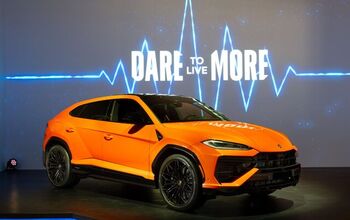Paris Auto Show: A Short Test Drive in the Electric Mitsubishi IMiEV

Take that, GM. Formerly-sick car company Mitsubishi Motors has a working electric car; they’re already testing a fleet of a few hundred units in Japan. The Mitsubishi innovative Vehicle promises a 75mph top speed and a 100 mile range. It’ll take seven hours to recharge the battery using a normal socket (220V). If you’ve got high voltage, figure an 80 percent recharge within 30 minutes. Being a totally new car, the iMiEV benefits from the packaging advantages inherent to electric propulsion. The Li-Ion batteries are located beneath the passenger department, and the small electric engine is rear-midships. Thus, despite a sub-four meter’s length, it’s roomy enough for four. The Innovative Vehicle’s interior is airy but spartan/simple– no expensive materials for a lightweight car that wants to be affordable for commuters. I could only take the Mitsu EV for a few-minutes’ spin in a parking lot, so I can’t verify any of company’s range or speed claims. But acceleration is strong, smooth and silent, the steering is pleasant, and it brakes in a solid fashion. It feels like a proper, developed car, not like a prototype. No magic-year nonsense; commercial sales will begin in 2009. If Mitsubishi can keep their performance promises, this one’s a winner, at least for urban early adopters.

More by Martin Schwoerer
Latest Car Reviews
Read moreLatest Product Reviews
Read moreRecent Comments
- EBFlex Interesting. We are told there is insatiable demand for EVs yet here is another major manufacturer pivoting away from EV manufacturing and going to hybrid. Did these manufacturers finally realize that the government lied to them and that consumers really don’t want EVs?
- Kwik_Shift_Pro4X What's worse than a Malibu?
- MaintenanceCosts The current Malibu is poorly packaged; there's far more room inside a Camry or Accord, even though the exterior footprint is similar. It doesn't have any standout attributes to balance out the poor packaging. I won't miss it. But it is regrettable that none of our US-based carmakers will be selling an ordinary sedan in their home market.
- Jkross22 You can tell these companies are phoning these big sedans in. Tech isn't luxury. Hard to figure out isn't luxury.This looks terrible, there are a lot of screens, there's a lot to get used to and it's not that powerful. BMW gave up on this car along time ago. The nesting doll approach used to work when all of their cars were phenomenal. It doesn't work when there's nothing to aspire to with this brand, which is where they are today. Just had seen an A8 - prior generation before the current. What a sharp looking car. I didn't like how they drove, but they were beautifully designed. The current LS is a dog. The new A8 is ok, but the interior is a disaster, the Mercedes is peak gaudy and arguably Genesis gets closest to what these all should be, although it's no looker either.
- Ajla My only experience with this final version of the Malibu was a lady in her 70s literally crying to me about having one as a loaner while her Equinox got its engine replaced under warranty. The problem was that she could not comfortably get in and out of it.



































Comments
Join the conversation
Unveiled in Paris as a Concept in 2000, the German Automaker's Production Version Carries Pure Racing Genes and Showcases Future Porsche Technology. Stuttgart, Germany-based Dr. http://www.autotruckserviceinc.com
Actually looks like a VW Beetle and an Audi TT had a 3-way with an electric city car with this being the result. I like it though. http://www.superdupercars.com